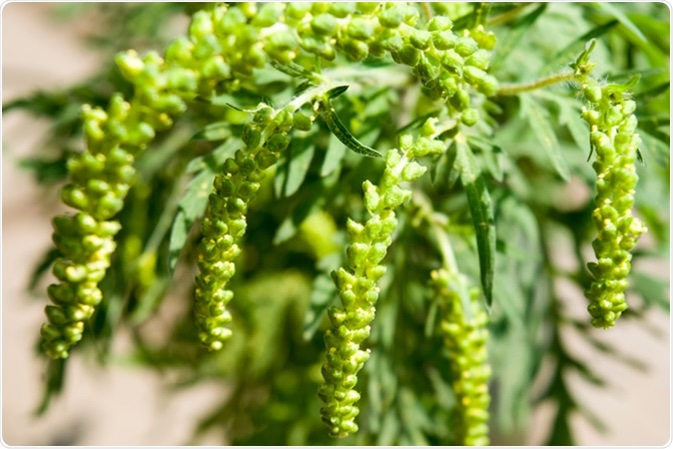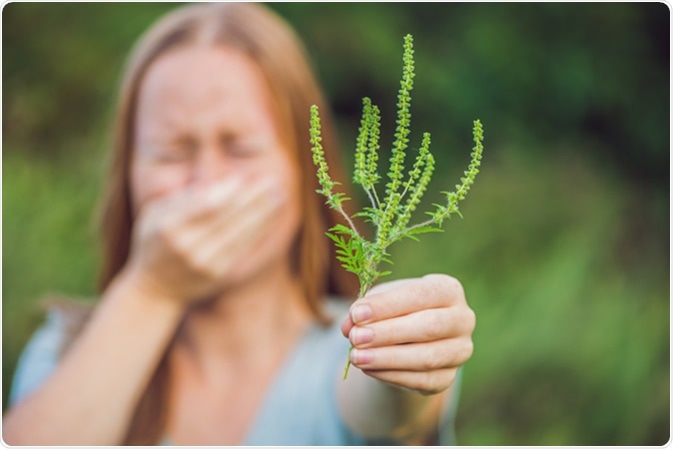Skip to:
The ragweed is a plant belonging to the genus Ambrosia, a flowering plant from North America that is now invasive in many areas of the world. Ragweed plants occur in several different types and grow in a variety of regions. However, all of them produce the fine powdery pollen which causes hay fever. There are 22 allergens known to occur in ragweed, of which six cause major allergies. The most prominent species of ragweed causing allergy is A. artemisifolia.

Ragweed pollen is notorious for causing allergic reactions in humans, specifically allergic rhinitis. Image Credit: FloriCos / Shutterstock
Ragweed is known for producing allergies, especially towards the end of summer and the beginning of autumn. This is because this plant releases the maximum amount of pollen towards this period, causing seasonal allergic rhinitis or hay fever. This illness is fairly common, with about 23 million people in the US being affected every year. About 15% to 26% of the US population is sensitized against ragweed pollen. Different parts of Europe such as France, Hungary and northern Italy have shown sensitization rates of up to 70%. In Asia, on the other hand, only about 5% of the people are sensitized to ragweed pollen.
What are the symptoms of ragweed allergy?
The symptoms are well-known and include:
- Sneezing
- Runny nose
- Congestion of the nose
- Headaches
- Conjunctival irritation
- Itching of the throat
In asthmatics it can cause coughing and wheezing, aggravating asthma symptoms. Children with ragweed allergy are known to be at higher risk of developing allergic asthma compared to those without it. This progression is called the “allergic march”. Moreover, it can also cause new allergies to develop to other substances.

Young woman sneezing due to allergy to ragweed Image Credit: Elizaveta Galitckaia / Shutterstock
Another less common manifestation is the oral allergy syndrome, which occurs in some people with ragweed allergy after eating specific plant-based foods. They feel itching in the mouth or throat, or develop swelling of the lips, mouth, throat or tongue. The reason for the reaction is a cross-reaction between the immune cells and the food proteins which resemble ragweed antigens in some respects, enough to fool the immune system. For those with ragweed allergy, members of the cucumber family (cucumbers, melons, and zucchini), as well as sunflower seeds and bananas can be associated with oral allergy syndrome.
How is ragweed allergy diagnosed?
A person who has symptoms of hay fever occurring during late summer and fall should consider the strong possibility of ragweed allergy. This can be confirmed with a skin test, conducted by an allergist, in which the allergen – the extract of ragweed pollen in highly diluted form – is applied to the skin surface by scratching or by injection just under the skin surface. If the person is allergic, the skin will develop raised red wheals or bumps over the site of testing within 15 minutes.
How is ragweed allergy treated?
The symptoms of ragweed allergy can be managed with antihistamine and other anti-allergy medications. Drugs to control inflammation of the nose and eye include glucocorticoids applied topically inside the nose, mast cell stabilizers, leukotriene antagonists, and eye drops to combat conjunctival inflammation.
For allergic asthma due to ragweed pollen, inhaled corticosteroids are the mainstay, along with beta2-agonists. The former are given as soon as symptoms come on and should be continued for another four weeks following the end of the pollen season. Beta2-agonists (such as albuterol) are fast-acting medications that relieve bronchospasm.
Since this is a seasonal allergy, many affected people start to take these medications about two weeks before they expect the symptoms to be at their worst, from previous experience. The right regimen can be worked out in consultation with an allergist.
Newer drugs being tried for ragweed allergy include selective H3 antagonists, DP2 and LTB4 receptors, and TLR modulators, which are being developed for better efficiency, reduced adverse effects and greater convenience.
Ragweed allergy treatment is adequate in only about half of all patients and cannot modify the course of the illness. Another approach is allergen immunotherapy, which is usually recommended when people have severe allergy symptoms despite treatment; do not wish to take medications long-term or even to prevent the development of allergic asthma in children with hay fever. First used in 1911, this therapy has been proved effective in treating this disease.
Immunotherapy takes two forms at present: subcutaneous immunotherapy or SCIT, and sublingual immunotherapy or SLIT. This type of treatment is meant to induce immune tolerance towards the allergen, in this case, ragweed pollen, so that it will not produce hypersensitivity reactions any longer. While both are effective, SCIT takes longer than SLIT and is associated with more serious (albeit rare) side effects; hence, it is only performed in a doctor’s office.
Preventing ragweed allergy
A typical Ambrosia plant releases about one billion pollen grains over one season. Pollen grains can be large (15-25 mm) or small (less than 10 microns). In order to avoid ragweed allergy, it is best to keep away from pollen during those times when there is a lot of pollen in the air. In summer and fall, ragweed pollen levels are highest in the morning. Keeping the windows closed at home and during travel, changing clothes which could have been exposed to pollen, bathing before bed, are all tips to help you prevent symptoms of this allergy.
Oral allergy symptoms can be prevented by peeling, canning or cooking the food before consuming.
Ragweed Allergies | Seasonal Science | UNC-TV
Further Reading
Last Updated: Sep 11, 2019